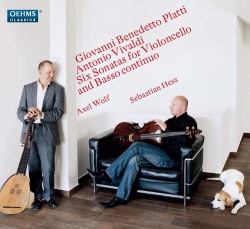
|
Giovanni Benedetto PLATTI (1697?-1763)
Sonata prima in g minor (WD 698,1) [10:09]
Sonata seconda in d minor (WD 698,2) [7:54]
Sonata quarta in c minor (WD 698,4) [9:41]
Sonata in C (WD 698,3): adagio [2:49]
Antonio VIVALDI (1678-1741)
Sonata in a minor (RV 44) [11:31]
Sonata in g minor (RV 42) [12:47]
Sonata in B flat (RV 46) [9:53]
Sebastian Hess (cello), Axel Wolf (lute, theorbo)
rec. 2012, St. Jacobus-Kirche, Großlangheim, Germany. DDD.
OEHMS OC881 [64:48]
Several personalities have played an notable role in music history despite not making a name for themselves as composers or virtuosic performers. Examples include the Roman cardinals Pamphili and Ottoboni who inspired many composers to write for performances at their respective courts. The music on the present disc is also inspired by such a patron, Prince Rudolf Franz Erwein von Schönborn-Wiesentheid, who was a great music-lover and an avid collector of scores. As he was a skilled player of the cello the largest part of his music collection comprises pieces for cello or at least with a significant part for his instrument.
Giovanni Benedetto Platti is especially well represented in this collection. He was born in Venice and came to Würzburg, where in 1724 he was appointed oboist in the orchestra of the Prince-Archbishop Lothar Franz von Schönborn, Rudolf Franz Erwein's brother. Only two years later the archbishop died and his successor, one of his brothers, cared little for music on account of which Platti spent some years at the court in Wiesentheid. There he often played music with the Prince, and provided him with many pieces for the cello. The Prince also purchased music and collected editions and manuscripts on his journeys. In some cases he approached composers and asked them to write music for him. It seems very likely that the sixteen sonatas from the pen of Antonio Caldara were the result of a commission from the Prince. His library has survived and includes around 150 prints and about 500 manuscripts of music.
That library includes at least two of the sonatas by Vivaldi, as played here, RV 42 and 46. One may consider some of Vivaldi's concertos for violin, his own instrument, as tending to superficiality and too much focusing on virtuosity for its own sake. That was certainly the view of Giuseppe Tartini but there is nothing superficial in the cello sonatas. The slow movements are full of expression and the fast movements often quite dramatic. Vivaldi the opera composer is not far away.
In this respect Platti's sonatas are more modest, also in regard to virtuosity. However, they are very well written and contain many memorable moments, for instance the fast descending figure in the second movement of the Sonata I (WD 698,1). The opening movement of the Sonata IV (WD 698,4) is an example of superb lyricism. The adagio, the only movement from the Sonata III (WD 698,3) recorded here, is highly expressive and has been well chosen to close this disc.
Composers of the baroque era left it mostly to the performers to choose the scoring of the basso continuo. The combination of cello and harpsichord or organ, often joined by a plucked instrument, was the most frequent solution. Here the performers have chosen a 'minimal' option: just one lute or theorbo. That makes a nice change from common practice but the downside is that the bass presence is rather reduced. I prefer the harpsichord as it brings in a more satisfying balance between the cello and the basso continuo. That is only a minor issue, though, because Sebastian Hess here plays these sonatas beautifully. He is energetic in the fast movements, emphasizing the rhythmic pulse with dynamic accents, and fully explores the lyrical and expressive moments, especially in the slow movements.
This disc is another indication of the growing interest in Platti's music and it is well deserved. This demonstrates the quality of his music and makes one understand that Prince Rudolf Franz Erwein recommended this "good fellow" to the imperial court in Vienna. Fortunately for him Platti stayed in Würzburg until the end of his life.
Johan van Veen
http://www.musica-dei-donum.org
https://twitter.com/johanvanveen
 |
 |
|



 All Nimbus reviews
All Nimbus reviews








